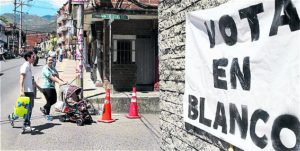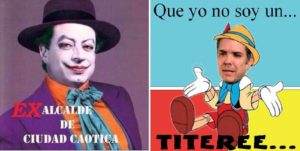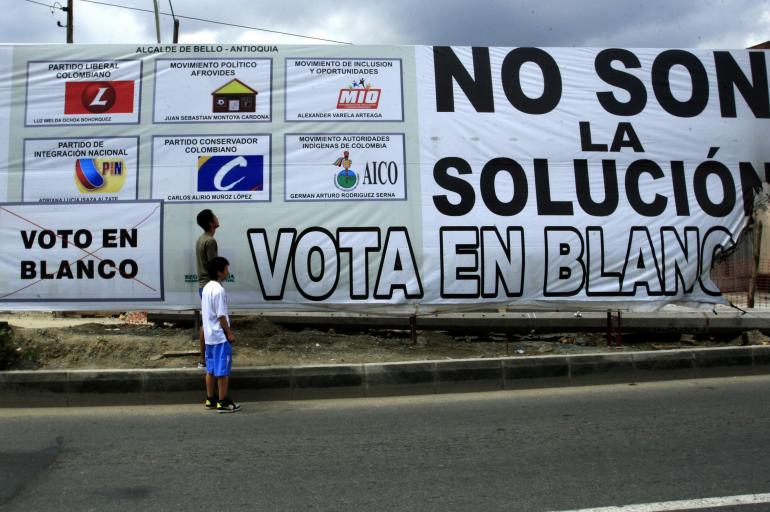Though largely symbolic, a high number of voto en blanco votes would send a message to the next president
By Fred Ellis
It’s a common problem in many democracies: you want to be a good citizen and support democratic principles, but all the politicians in front of you are slimy little shits. It’s not a new phenomenon – remember the 2002 French presidential election between the racist (Jean-Marie Le Pen) and the crook (Jacques Chirac)? In an age where polarisation is a growing problem, and the centre is disappearing to politicians who increasingly play on people’s fears and bigotries, plenty of moderate voters have been abandoned. That’s why, around the world, the same refrain about politicians can be heard: “they’re all the same, it doesn’t matter who you vote for”. That’s why the likes of Trump exist, but such extreme candidates simply alienate yet more centrist voters.
In Colombia, though, there’s another option available to you: voto en blanco, or the blank vote. This is not to be confused with spoiling your ballot. It’s an active rejection of the candidates on offer. Voto en blanco – if it were to ever “win” an election over the slate of candidates thrust upon voters – would mean that everyone has to go to the polls again, and the original candidates are sacked off. Those candidates can’t ever run again.
While this is true only during the first round of Colombian elections, there’s a lot to be said for voto en blanco in this particular second round run-off. Both candidates divide opinion sharply and struggle to pull in moderates. What’s worse, many people are likely to vote for one simply because he’s not the other. Plenty of people plan to vote for Duque simply because they think Petro is a bad administrator and will be ruinous for the economy. On the other hand, there are likely to be lots of first-round voters of Sergio Fajardo who’ll hold their noses and simply go out and vote against Alvaro Uribe’s puppet.
Related: Colombia ‘Choosing Between AIDS and Terminal Cancer’?
Wouldn’t it be better to have the option of rejection? To say that neither candidate has appealed to you sufficiently, and that they both should piss off? We can’t do that in the UK, but I’d bet a pound to a penny that British voters would snap that option up if they had the chance. If you feel that the country is run by corrupt oligarchs who choose one or another of their bloated pupae to parade in front of you, it’s pretty reasonable to reject the whole pack of cunts.
The argument made by the Registrar’s Office is that Colombia made a choice on May 27, and if they wanted to, citizens could have taken their voto en blanco then. As they didn’t, they should now be forced to make a decision. That’s logical in its way, as Gustavo Petro and Ivan Duque combined pulled in well over half the votes cast in the first round. However, they certainly didn’t convince half the electorate, and vast swathes of them didn’t even bother to turn up to the polls on election day.

People walk past a poster urging voters to cast a blank vote in the town of Bello, Antioquia, Colombia, in 2011.
The effectiveness of voto en blanco is not without precedent in Colombia. During local elections in the town of Bello, Antioquia province, in 2011, a majority of voters case a blank vote – voto en blanco won – and the entire crop of people running for office was thrown out, leaving the political parties there scrambling to put forth alternative candidates that the electorate might find more palatable.
But this time around, there’s a big elephant in the room. Voto en blanco is essentially a spoiled ballot, as in the second round run-off vote, the practice does not have the power to throw out the current pair of candidates. No, either Petro, or (more likely) Duque will be elected president on June 17. But that’s not necessarily the point – the people planning to voto en blanco are voting with their conscience. It’ll be a protest vote. That protest has limited effect in reality, but it could show us how many people oppose the two candidates that Colombia has hemmed themselves in with.
Even more importantly, a critical mass of protest votes would force the president-elect to pause for a minute and take notice.
After all, democracy should rely on people voting with their conscience. People who wish to voto en blanco are not rejecting the democratic system, just the candidates who seek to rule their land. If the alternative is simply to bully the floating voters into a vote for the lesser of two evils, then haven’t we all been cheated?
Related: Status Quo Upheld in Chaotic Colombia Election
Both Duque’s and Petro’s social media warriors have been in full swing, as meme after meme after furious twitterstorm has denounced voto en blanco as tantamount to treason. Voters are being urged to put the country first and not vote for Duque/Petro. That’s a pretty weak argument. Whichever option wins is the direction we all go in. Democracy shouldn’t be a strategic game to be won, it should be a genuine representation of the will of the people. If that will prefers to say “get to fuck, you shower of bastards”, then should that not be heard, and represented? After all, if the only reason not to do something is because of “well, no-one else will do it”, then you have no moral ground to stand on.

A sample of just two of the thousands of memes found around the internet and on social media that make fun of Colombia’s presidential candidates.
Realistically, voto en blanco isn’t likely to do well on June 17, and as mentioned before, it wouldn’t really matter if it did anyway. It’s been confirmed that it won’t apply, and that pretty much kills it stone dead for most people. But Fajardo and fellow first-round candidate Humberto De la Calle have announced their intention to voto en blanco, in the run-off, and that has given the concept a much-needed shot in the arm. How many people who voted for one of them will follow their lead and cast a blank vote? How many will decide to avoid turning up at the polls at all?
Where the impact of voto en blanco could really be felt, then, is on the Petro campaign. To win the second round, he is relying on Fajardo and De la Calle voters coming to him en masse. But the Colombian left is fractured. If they instead follow the proclamations of their first choices, that could choke him of the support he so desperately needs against the fearsome political engines of uribismo that are arrayed against him.
Will the floating centrist voters play king-maker on June 17, or will they raise their voices in protest? Voto en blanco this time around is symbolic but important – it means that you think a populist demagogue is as bad as Putin-Medvedev-style puppetry, and that neither should be given the privilege of running the country.
—
Fred Ellis is a British freelance writer based in Bogota, Colombia, where he has lived for the past six years. He doesn’t always see the world in the same way as everyone else.

Journalist. Misfit. Malcontent. Provocateur. Is a better Colombia is possible? We’re starting to have doubts.


Pingback:Welcome to Uribe 2.0 | MiKolombia.com